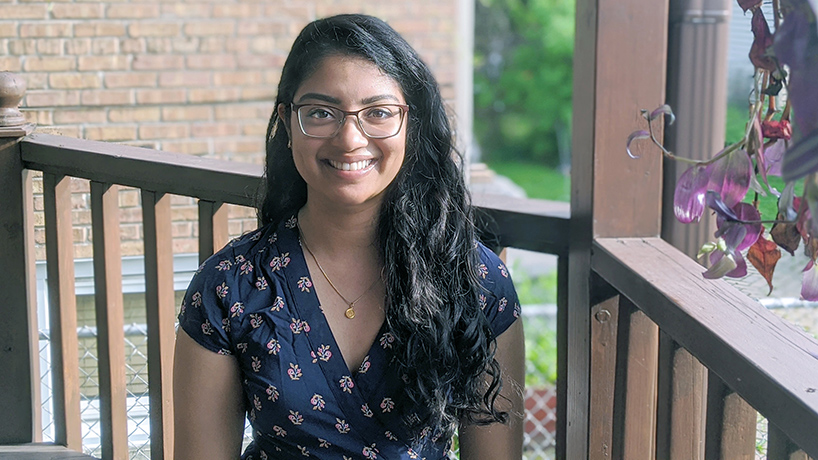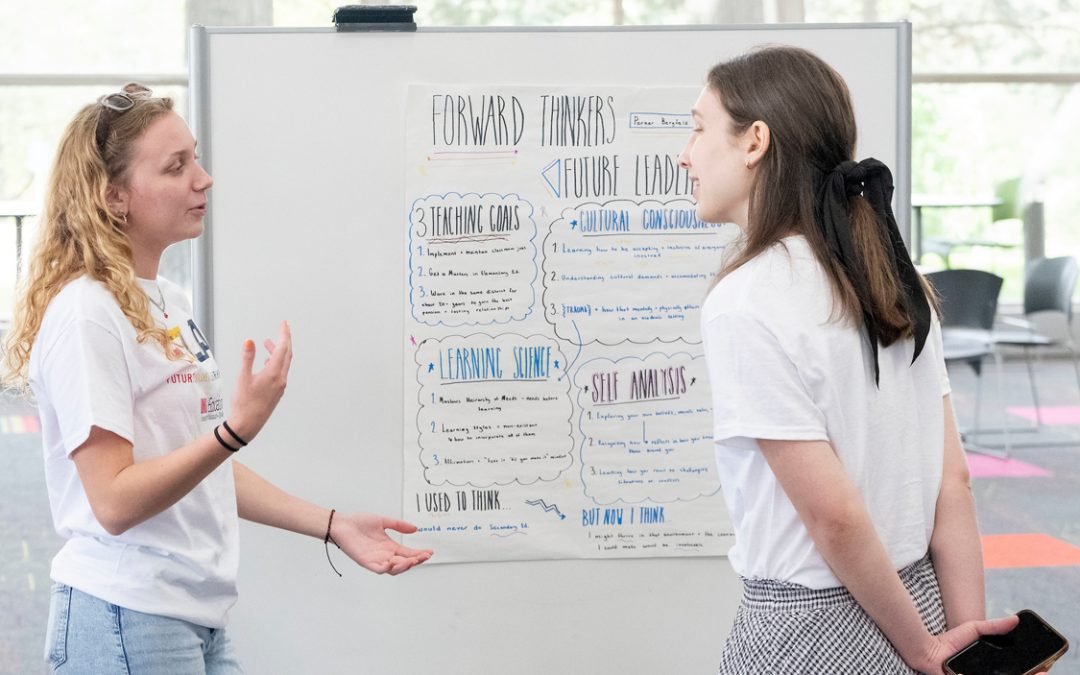
College of Optometry graduate Jane Lakayil will start an ocular disease residency program at the VA Illiana Health Care System after graduating this semester. (Photo courtesy of Jane Lakayil)
Last weekend, Jane Lakayil metaphorically crossed a finish line that was 13 years in the making.
That’s when the University of Missouri–St. Louis student graduated from the seven-year Scholars Program, which combines three years of undergraduate studies through the Pierre Laclede Honors College with four years earning an OD from the College of Optometry.
At 11 years old, Lakayil first started dreaming of becoming at optometrist. Her eye doctor, a classmate’s mother, inspired her career path.
“I felt really comfortable with her,” Lakayil said. “She was so kind. She always took a lot of time to talk to our family. Eye exams were always so mysterious and fun to me. You have all the color testing and the puff of air and it all seemed like, ‘Oh, what could this possibly mean?’ I was so intrigued.”
On the other side of the mystery now, she hopes to use her degree to treat her patients thoughtfully and benefit their overall health as she heads off to a residency program at Veterans Affairs Illiana Health Care System in central Illinois. Throughout her seven years at UMSL, Lakayil found her passion in ocular disease and hopes to use her knowledge to help those in need.
Though it was the shortened degree program that drew the Chicago native to UMSL, she made a home on campus, taking the trademark Honors College classes, writing for The Current, participating in Pre-Optometry Club, living on campus for six years and using the metro to get around St. Louis without a car. Throughout that time, Lakayil’s education has been supported by non-resident, academic and Honors College scholarships.
Lakayil felt completing her BA in biology within three years had prepared her for the rigors of the professional program and that the Honors College helped her develop the social skills necessary when talking with patients.
“I was already accustomed to having a heavy course load, so that made me ready without me realizing it,” she said. “The Honors College gave me a really good balance in my schoolwork with a lot of small classes and discussion-based learning that helped me with my adjustment process because it was easy to get to know people, become friends with them, and get into study groups in my small optometry class size of 46.”
When Lakayil entered optometry school, she knew she’d be learning about the interactions between eyes and the body, but her depth of knowledge quickly passed expectations. That was never more apparent than in her Anatomy and Physiology course, which she was surprised to find included 10 lectures on cardiology and opened her eyes to the intricacies of the human body.
She was quickly fascinated and became interested in ocular disease, which ultimately led to her post-graduation residency.
“People may not go to their primary care doctor as regularly as they should,” Lakayil said. “Understanding the importance behind your eye health and how it correlates with your systemic health struck a chord with me. Being able to talk to my patients about what their exam has shown me about their general health is important. It helps me be excited about going to work every day, and it’s really powerful to be able to educate people in that way.”
Treating ocular disease often means ordering medical tests like bloodwork, labs or CT scans, but the typical optometrist’s office includes none of these things, which can make treating patients challenging.
That was on Lakayil’s mind during her last year of school as she headed off to clinical rotations in a wide variety of settings – at UMSL Eye Care, Affinia Healthcare, an Indian Health Service hospital in Oklahoma, a rural practice in Springfield, Missouri, and then Missouri University Health Care.
Those experiences, especially at MU, helped Lakayil realize she’d like her future practice to be in a hospital where testing and collaboration with other doctors was within reach.
“It’s really been thrilling to me that I can do all the things that I need to do in one place,” she said. “My patients get good continuity of care, and then I’m able to see those results. It’s very fast paced and exciting. There are a lot of ophthalmologists and optometrists to learn from. It kept me on my toes. It was very challenging, but also rewarding. I felt very supported there, so it also taught me the importance of good collaboration.”
At MU, Lakayil worked with UMSL alumna Dr. Kelli Shaon. She made a big impact on how Lakayil views optometry and treating patients and taught her the importance of mentorship.
As she heads off to her post-graduate studies, she acknowledges Shaon and the year of rotations have inspired something of a long-term goal in Lakayil.
“This past year has taught me the importance of having a mentor that you can talk with,” she said. “Ask questions without having to feel nervous about what they’ll think. Having someone that you feel like always has a good answer, and even if they don’t know the answer, being able to guide you to the correct resources. I think being able to do that in the future as an attending doctor working with optometry students would be really rewarding. It would be rewarding to be able to pass on the kindness I have received from so many doctors this past year.”














